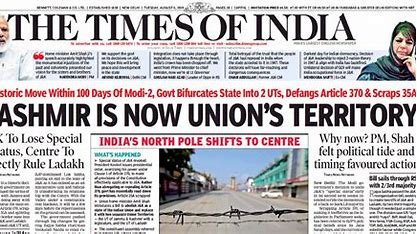Located roughly 60 miles to the northeast of the national capital New Delhi, the industrial town of Meerut has emerged as a major pit stop in the poll-bound northern Indian state of Uttar Pradesh. Political leaders of several major parties have headed to this city to campaign in the upcoming state assembly elections.
Elections to the 403-seat Uttar Pradesh assembly will begin on February 10. The state will vote in seven phases. Meerut will vote in the first phase.
Meerut has played an important role in India’s history. It was here that India’s First War of Independence in 1857, which British historians term the Mutiny of 1857, began. In what was known as the Meerut Conspiracy Case, the British colonial rulers initiated the trial of around 29 Communist trade union leaders in 1929 for allegedly attempting “to deprive the King Emperor of the sovereignty of British India.” Twenty-seven of the accused were convicted.
At first sight, Meerut looks like any other city in India’s heartland. It takes a little over an hour to drive from Delhi to this town on the newly constructed Delhi-Meerut expressway. Dusty lanes and flyovers greet you as you “fly over” crowded alleys and cramped houses to make your way into the political heartland of India — Uttar Pradesh. India’s most populated state, Uttar Pradesh accounts for 80 seats in the Indian parliament.
Meerut is the cynosure of all eyes these days. Uttar Pradesh Chief Minister and Bharatiya Janata Party (BJP) leader Yogi Adityanath was there recently and made a highly publicized visit to homes of Dalits. Samajwadi Party leader Akhilesh Yadav and his alliance partner, Rashtriya Lok Dal chief Chaudhary Jayant Singh, also visited Meerut recently. Earlier, on January 2, Prime Minister Narendra Modi was in Meerut to lay the foundation of a world-class sports university in the city.
Interestingly, Modi has been a frequent visitor to the city. He began his campaign in the Hindi heartland for the 2019 general elections too at Meerut. His first visit in 2014 saw him reminisce about Meerut’s role in India’s freedom struggle. He then went on to point out that, like Ahmedabad in his home state of Gujarat, Meerut too saw frequent rioting. This was an important parallel to draw as Meerut is indeed a hotbed for communal politics.
Meerut is a traditional stronghold of the Jat community in western Uttar Pradesh. Muslims comprise 34.43 percent of the city’s population, making it vulnerable to communal politics.
In an article, India expert Paul R. Brass argued that Meerut is a site of “endemic rioting” and professes an “institutionalized riot system” where riots are manufactured by like-minded individuals through the passing of sensitive information and provocation in such a way that these activities lead to a systematic rise in communal tensions, eventually resulting in full-fledged riots.
The communal riots that rocked Maliana and Meerut in 1987 are a good example of the engineering of riots. Amid rising tensions in Uttar Pradesh over the reopening of the Babri Masjid in 1986-87, inflammatory speeches by Muslim leaders sparked Hindu-Muslim violence in Maliana.
The BJP now claims that it has changed the nature of the city and that it has halted rioting in the state. But that is far from true.
Meerut is close to districts like Saharanpur and Muzaffarnagar, which like Meerut have large Muslim populations. Political parties often consider Muslims a “vote bank,” a source of votes to draw on during elections. This has prompted politicians to flock to Meerut to solicit votes.
Communal polarization has grown in recent years, especially after the Muzaffarnagar violence between the dominant Hindu community and Muslims in 2013, and the Kairana violence, where it was alleged that local Hindus had to flee the area over threats from Muslims.
The Hindu and Muslim communities in Meerut are deeply suspicious of each other. While this suspicion has a historical genesis, this suspicion has grown fiercer in recent years with inherent antipathy toward members of the minority community becoming a part of everyday life.
Allegations of “land jihad” – an idea that Muslims are engaging in land grabs and occupying Hindu neighborhoods – and “love jihad” – an idea that Muslim men are luring Hindu women into marriage – are being leveled against Muslims. The ideological battle lines are hardening.
Meerut is only a starting point of what is to come. While these elections will be over in a few weeks and the tense situation on the ground will cool down, one wonders how it will impact the idea of a secular India, which has been under siege for a while.
As a microcosm of Uttar Pradesh, Meerut has held the key to power in the state. It is a microcosm of India too. The outcome of elections here could provide pointers to what lies ahead for India.
- Meerut, Uttar Pradesh, becomes a significant political battleground ahead of state assembly elections.
- The city holds historical significance as the site where India’s First War of Independence began in 1857.
- Several prominent political leaders, including Prime Minister Narendra Modi, have campaigned in Meerut recently.
- Communal politics and religious tensions have been on the rise in Meerut, making it a focal point in Indian politics.
- The upcoming elections in Meerut and Uttar Pradesh may have implications for the future of secularism in India.


